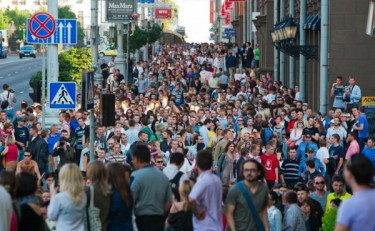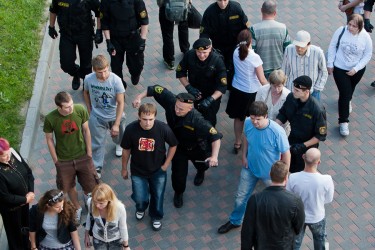A non-violent rally in Minsk, organized via Vkontakte, a Russian social network popular in Belarus and other former Soviet states, ended up with more than 450 people detained. Arrests, trials and numerous detentions, however, do not appear to have stopped the protesters.
Non-violent rally organized online
The day chosen for the rally was June 22, 2011, 19:00 (dubbed with a Twitter hashtag #2206v1900).

So, #Minsk? How about having it like this? – June 22, 2011, photo of the rally by Anton Motolko at Twitpic
Several Vkontakte groups were set up in order to organize the protest actions; “Movement of the Future” [ru] was the most popular one, with nearly 214,000 members.
The police, however, not only prosecuted the groups’ moderators, but were also inviting [ru] ordinary members (those they could find) to ‘preventive conversations,’ during which they tried to discourage people from participating in the rallies.
The government goes online as well
The Belarusian regime, in addition to using violence, censorship, and prosecution, chose not to ignore Twitter as well. Back in April 2011, the Belarusian Ministry of the Interior launched [ru] its @mvd_by [ru] account, and the Minsk Police Department (@GUVD_Minsk [ru]) followed suit.
Throughout the rally, both accounts were tweeting actively, discouraging those planning to participate, arguing [ru] that any Internet-organized revolution was in direct violation of the Belarusian laws. @GUVD_Minsk directly addressed (and probably promoted) [ru] its nemesis:
#1.Кто собирается «на плошчу», обратите внимание на посты @InternetRevolt – он в открытую подстрекает вас, но отвечать придется вам!
In particular, the Ministry warned people about possible administrative charges for participating in unsanctioned protests, advised them against trying to film the events with their cell phones and engaging with police officers, and suggested that everyone bring their passports along.
The authorities’ Twitter recommendations, however, have failed to keep the people from joining the protests.
The coverage of #22o6v1900
According to Reuters, nearly 1,000 people gathered for the June 22 rally in Minsk. The following YouTube videos were collected in a Storify post by GV Author Asteris Masouras:
http://www.youtube.com/watch?v=l1FzXMr2qeo
The rallies were covered by many bloggers and online media. Among the most popular photo reports were those made by Minsk-based Anton Motolko (@motolko [ru]), euroradio.by [ru].
Blogger toxaby published [ru] posts showing special police units seizing activists. He emphasized that the police had violated the Belarusian penal code, and translated the relevant article of the penal code into several languages.
“The beginning of the end”?
In a lengthy post, Pyotr Kuznetsov, the coordinator of “For the Freedom” movement, explained [ru] the significance of the non-violent rally held on June 22:
Во-первых, власть к такому повороту событий не готова, не способна предложить (навязать?) свой сценарий, и поэтому находится в прострации, до сих пор не определившись со своей линией поведения. […]
Во-вторых, власть явно не обладает достаточными физическими ресурсами для подавления движения в масштабах всей страны, и это тоже – стратегический козырь недовольного народа.
И, в-третьих, используя современные средства коммуникации и социализации, организаторы акции поставили власть и спецслужбы в положение заранее проигрывающих: невозможно ногами сотрудников КГБ опередить молниеносное информационное воздействие Интернета.
First, the authorities weren't ready for such a turn of events, they were unable to propose (or to impose?) their own scenario, and that's why they are in limbo, still unsure of how to behave. […]
Second, the regime obviously doesn't have enough physical resources to suppress a nationwide movement, and this is also a strategic trump card of the unsatisfied people.
And, third, by using the contemporary means of communication and socialization, the organizers of the action have put the government and the special services into a position of losers by default: the KGB agents simply cannot forestall the lightning-fast informational impact of the Internet.
My own Facebook friend, Volia Ch., explained the situation much more succinctly:
![]()









11 comments
Belarusians need our support! “Global Support for Belarus!” action on Facebook: https://www.facebook.com/event.php?eid=231659110185352